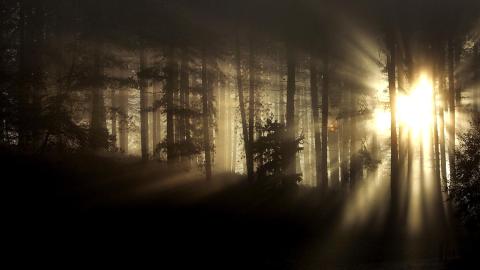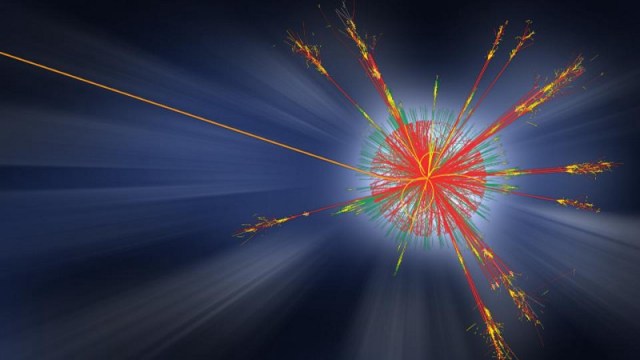Can you be scientific and spiritual?

- While the anti-scientific bias of religious fundamentalism requires condemnation, if we take a broader view, does the human inclination towards spiritual practice still require the same antagonism? The answer, I think, is a definitive “No.”
- Rather than ontological claims about what exists in the universe, the terms spiritual and sacred can describe the character of an experience. Instead of a “thing” they can refer to an attitude or an approach.
- One can be entirely faithful to the path of inquiry and honesty that is science while making it one aspect of a broader practice embracing the totality of your experience as a human being in this more-than-human world.
The tension between science and religion is old news to us moderns. Historical events like the Catholic Church’s trial of Galileo or the Scopes Monkey Trial over teaching Darwin in schools, seem to imply that religion and science are incompatible. More recently, writers like Richard Dawkins, Daniel Dennett, and other ‘New Atheists’ have been vigorous in their condemnation of the anti-scientific bias of religious fundamentalism. But if we take a broader view beyond these fundamentalisms, if we ask about the human inclination towards spiritual practice in general, do we still have to find the same antagonism? The answer, I think, is a definitive “No.” And that answer is important as we consider the totality of what it means to be human.
First, it’s important to distinguish between religion and what I’ll call spiritual practice. In his excellent book “Sapiens,” Yuval Noah Harari defines religion as “a system of human norms and values that is founded in the belief in a superhuman order.” There are two parts of this definition that are important for our discussion. First is the “system of human norms.” That phrase points to a lot of stuff, but it also means politics. There is an aspect of organized religion that has always been about establishing and enforcing social norms: Who is an authority; who justifies who is in charge; who marries whom; who tells you how to behave. This aspect of religion is about power within social hierarchies.
The second part of Harari’s definition refers to a “superhuman order.” Note that he does not say a “supernatural” order. Why? Because some religions like Buddhism don’t pivot around the existence of an all-powerful deity. This distinction is important because it allows you to see a point many scholars of religion have made after looking at the long human history of what I’ll call spiritual endeavor. From our beginnings as hunter-gathers, we have always been responding to a sense of a “superhuman order.” That response has taken many different forms from beautiful paintings on cave walls to beautiful paintings on the ceiling of the Sistine Chapel.
Even though I consider myself an atheist, experiences of a superhuman order have been with me since I was a kid.
In my first book, I looked in depth at this response, its history, and its relation to science. Even though I consider myself an atheist, experiences of a superhuman order have been with me since I was a kid. Heck, that’s what science was to me—an order expressible in mathematics beyond the purely human. In fact, many of my deepest experiences of being alive had come to me through my scientific practice. Working through some line of mathematical reasoning or encountering some image of a nebula or galaxy, I’d get thrust into an overwhelming sense of the universe’s presence, of its perfect unity and wholeness. At first, I saw the laws of physics as the source of that order but as I got older my focus widened.
Now, one could say that my experiences were “just awe” and nothing more. But as the great scholar of religion, Rudolph Otto noted, awe is the essential component of a spiritual experience. It is an encounter with what other scholars have called “sacredness.”
So, what are we to make of these words “spiritual” and “sacred”? Some strident atheists recoil at these terms because they believe they must entail a belief in supernatural entities. This is a mistake. Both can point to something much broader. Rather than ontological claims about what exists in the universe, spiritual and sacred can describe the character of an experience. Instead of a “thing”, they can refer to an attitude or an approach. This is the central point William James made in his masterwork “The Varieties of Religious Experience.” To speak about sacredness is to understand that some experiences (the birth of your child, coming upon a silent forest glade, hearing a powerful symphony) evoke an order that is more than just our thoughts about that order. And to speak of “the spiritual” can call to the highest aspects of the human spirit: compassion, kindness, empathy, generosity, love.
This kind of understanding of spiritual and sacred have always been with us and they may, or may not, have anything to do with a particular religion. This is where we can draw a distinction between a spiritual practice and a religious one. In a spiritual practice, people purposely attempt to deepen their lived sense of the superhuman order they experience. It is, literally, a practice. You work on it every day, perhaps using meditation or ritual or service to others. The methods differ but the daily application and aspiration are the same.
The important point is that spiritual practice has a purpose: transformation. It is to become a person who lives in accord with that sense of experienced order, that sacredness. Such a lifelong aspiration and effort can happen within an individual religious tradition if there are domains within that tradition that truly support this kind of interior work. Unfortunately, the politics of religion can sometimes keep this from happening. As scholars Joseph Campbell, Walter Houston Clark, and others have said, church can be a “vaccination” against the real thing.
It’s also possible to build such a practice outside of established religious tradition. In that case, the difficulty comes in inventing forms that can support a lifelong practice. There is something to be said for traditions or rituals that have endured for many generations and the best of these often occur within some religious traditions.
Sam Harris: I’m Trying to Rehabilitate the Word “Spirituality”www.youtube.com
The bottom line is human beings have felt the need for spiritual practice for a long, long time. That means that even as participation in traditional religions drops, people claiming to be “spiritual but not religious” and people who embrace science continue to grow. The writer Annaka Harris and her spouse New Atheist Sam Harris are, for example, strong defenders of science. They have also both written about the importance of contemplative practice in their lives.
I have long argued that science is one way that the aspiration to know the true and the real is expressed. It is one way we express that sense of an order beyond us. But there are other ways that go beyond descriptions and explanation, and all of them make up the totality of being human. That means you can embrace science in all its power and still embed it within the larger context of human experience. All of us can be entirely faithful to the path of inquiry and honesty that is science while making it one aspect of a practice meant to embrace the fullness of your experience as a human in this more-than-human world.





